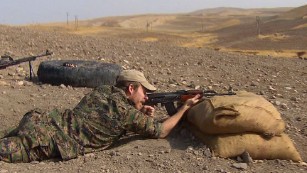A former U.S. soldier battling ISIS alongside Kurdish fighters in Syria has warned others tempted to join him that life on the front line is no computer game.
"You meet a lot of people who think this is going to be the gaming experience -- [like] Call of Duty," he told CNN at his remote camp near the Tigris River in northern Syria.
"They think because they understand how to pull the trigger on a console they know how to do it in real life."
Randy Roberts is one of dozens of westerners who have come to Syria and Iraq to join the YPG, and help them take on ISIS.
They are a mixed bunch of men and women, from Europe and North America; among them a Canadian medic from Alberta, a young Swedish woman and a burly middle-aged man from Spain's Basque country.
Roberts, who goes by the nickname "Red," is among the most experienced fighters here -- a former specialist with the 25th Infantry Division, he did two tours of duty with the U.S. Army in Iraq.
When ISIS began taking over large tracts of the country last year, he tried to join up again, but says his many tattoos meant he wasn't able to do so. Until recently, U.S. soldiers were banned from having more than four tattoos on their forearms and lower legs.
Shia and Yazidi.
"I felt that given my past military experience and that I'd been to this region before I felt I could contribute, I could actually help the cause," he told CNN.
He has been here for seven months, first in Iraq, where he and other foreign fighters joined an offensive south of Kirkuk in March that recaptured several villages occupied by ISIS.
In Syria, he says he has been involved in firefights around the city of Jarablus, which is still held by the terror group.
He is now helping to train new recruits -- some of whom had never handled a weapon before they arrived in the Middle East.
Roberts says it's crossed his mind many times that he too could be killed, but that's a price he's willing to pay.
"If I got to the end of my life and I hadn't come here ... then it would have bothered me. It would have bothered me for the rest of my life."
He has great admiration for his comrades in the YPG. He and other westerners here describe them as the bravest fighters they have ever seen.
But Roberts says they badly need basic military training to stem their battlefield losses.
And he foresees new dangers, if and when ISIS are defeated. "When ISIS is gone, they're going to need a standing military," Roberts says, because of other deep-seated regional rivalries.
He also has a grudging respect for the professionalism of some ISIS militants, especially those who have come from places like Chechnya. Like the YPG, ISIS also has scores of westerners fighting on its behalf.
"We've encountered guys that know what they are doing," he says. "They know how to use cover, how to use concealment and they understand how to manoeuver and they're trained by the Chechens that come over here."
Roberts described a battle south of Kirkuk where "outside of the mines they emplaced to keep us from advancing on these villages they also have little wadis and trenches that they hide in -- so they pop up and [fire] machine gun[s]."
Coalition airstrikes, he said, were vital in taking out ISIS positions.
Roberts is now planning to return home for a break, not least because he's almost out of money after spending most of this year here.


No comments:
Post a Comment